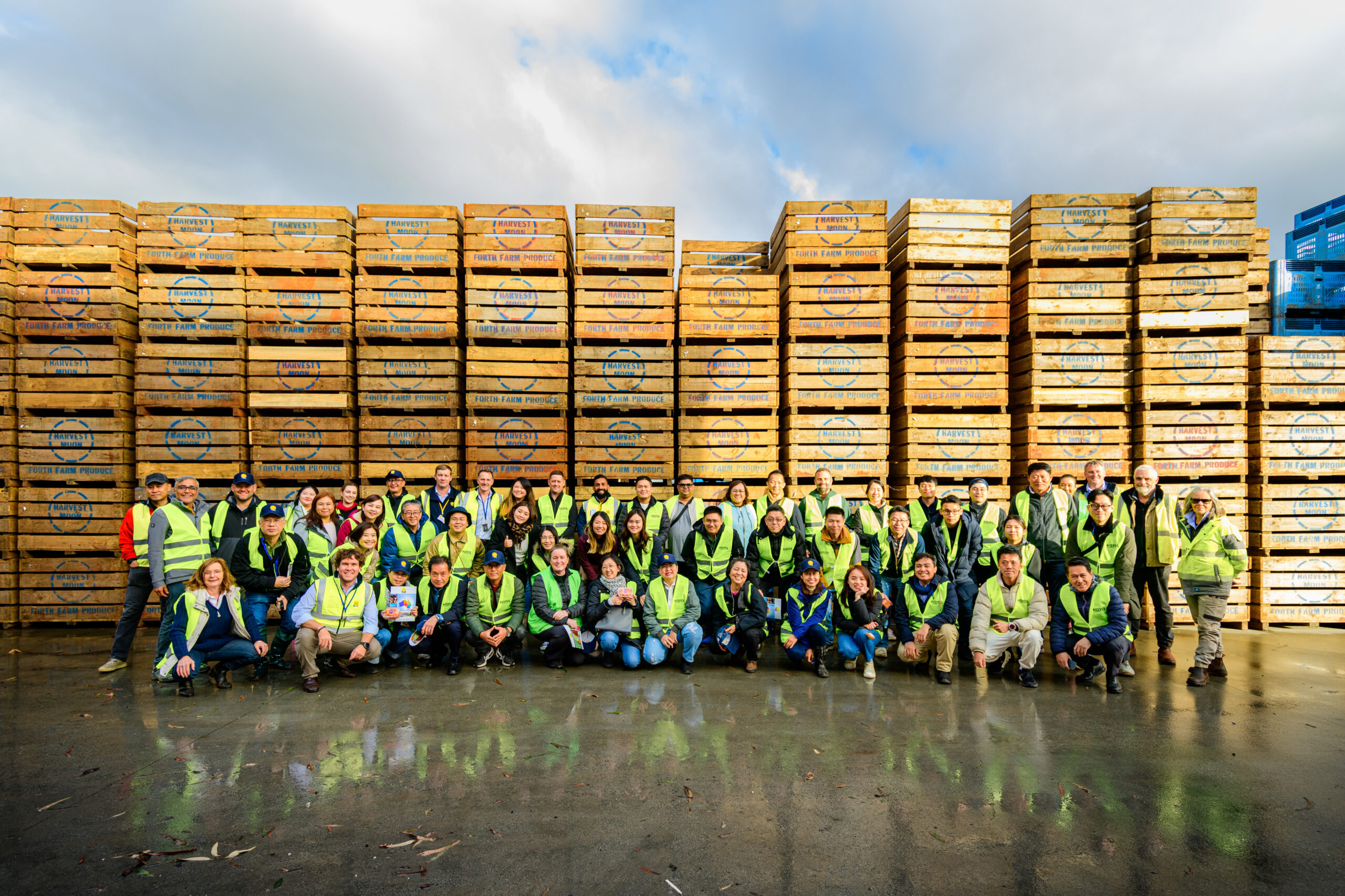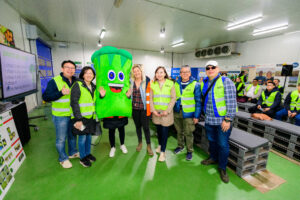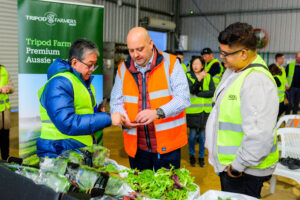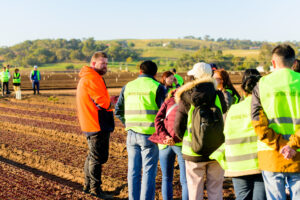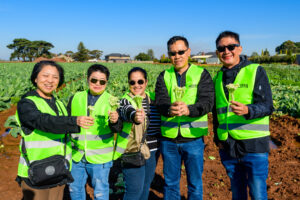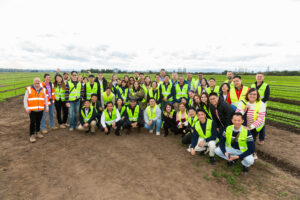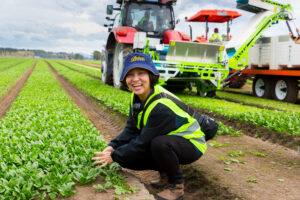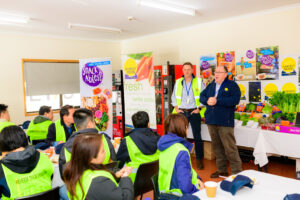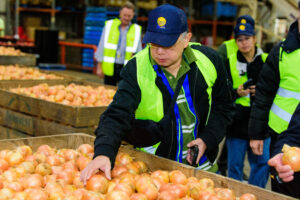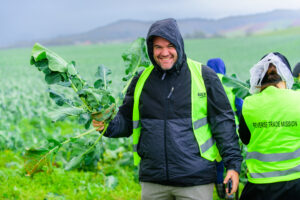Reverse Trade Mission 2024
The inbound trade mission aims to showcase Australia’s vegetable, onion, and melon industries to international buyers from various trading partners.
The 2024 Reverse Trade Mission ran from 28 May to 4 June, culminating at Hort Connections. This year, the program welcomed 40 international delegates representing eleven key export markets across the Middle East and Asia Pacific region, including Singapore, United Arab Emirates, Malaysia, Indonesia, Thailand, the Philippines, Hong Kong, Taiwan, Japan, South Korea, and Pacific Islands.
These markets have long been important trading partners for the Australian vegetable, onion, and melon industries. International trade development activities like the Reverse Trade Mission allow Australian grower-exporters to build business connections with international delegates, further strengthening and amplifying trade outcomes.
It provides the horticultural industry unique opportunities to showcase the Australian horticultural production capabilities as well as Research and Development (R&D) innovations that underpin Australia’s ability to produce some of the freshest, highest quality vegetables to international buyers from various export markets. The connections and networks established through the Reverse Trade Mission have created a vast network of alumni and grower-exporters who can exchange trade and innovation ideas, insights, and expertise. This exchange has led to the forging of long-lasting business relationships, significantly benefiting all participants.
Welcome Reception
The Reverse Trade Misson program commenced with a Welcome Reception hosted by AUSVEG and Global Victoria. This event set the tone for the week, providing an opportunity for delegates to network and engage in preliminary discussions about the mission’s objectives.
Delegates were welcomed by AUSVEG CEO Michael Coote, Global Victoria Senior Trade Manager Food and Fibre Exports Manager Ivan Veljkovic, Hort Innovation International Trade Manager Mimi Doan, and Austrade Senior Global Engagement Manager Phillip Georgios. They emphasised the importance of collaboration between the peak industry body, state governments, and research and development Corporations (RDCs), with the primary objective of growing the agriculture sector. They highlighted the need for a united front to drive demand from international markets and achieve shared success in export growth.
Exploring Victoria’s Agricultural Hubs
The first day of farm visits began with tours of Velisha Farms, Fresh Select, and Tripod Farmers in the Werribee and Bacchus Marsh region. Velisha Farms, a family-owned business since 1949, is renowned for its innovative practices and commitment to quality as well as offering practical programs for schools in Victoria to encourage young people to pursue professions in agriculture.
Fresh Select, located in Melbourne’s Werribee South region the ‘salad bowl of Victoria,’ is one of Australia’s largest lettuce and brassica farms. The delegates enjoyed lunch at Fresh Select with dishes incorporating Nurti V vegetable powders.
Tripod Farmers, with its focus on sustainability, offers a unique perspective on modern horticulture. The delegates were welcome with a demonstration on the latest laser weeder machinery. This cutting-edge tool uses precision lasers to target and eliminate weeds while leaving crops unharmed.
L_R Velisha Farms and Veg Education, Tripod Farmers
A Day in the Life of Victorian Farms
The trade mission journey started early with a visit to Bulmer Farms in Lindenow, East Gippsland, where delegates experienced firsthand the operations of a leading farm in the region. The group was greeted by the Bulmer team with a traditional Kiribati welcome dance by the workers. The visit included a detailed facility tour, a discussion on sustainable farming practices as well as a trip to the spinach field.
Following lunch at Bulmer Farms, the delegation proceeded to Dicky Bill in Maffra, known for its advanced farming methods and high-quality produce.
L-R Fresh Select, Dicky Bills and Bulmer Farms
Tasmania’s Agricultural Excellence
The Tasmanian leg of the tour started with Premium Fresh in Forth. Here, delegates were introduced to the unique agricultural conditions and practices that make Tasmania a crucial player in Australia’s agriculture sector. The tour continued to Harvest Moon, another major vegetable farm, where the delegates enjoyed lunch and engaged in discussions on market trends and future opportunities. In the afternoon delegates visited Sumich, further expanding their understanding of Tasmania’s onion sector landscape.
L-R: Harvest Moon
Diverse Farming Practices
The delegation then returned to Victoria and visited Hussey and Co in Somerville, renowned for its innovative farming techniques and excellence in packaged salad products. This was followed by a tour of Peninsula Fresh Organics in Baxter, where the delegates received the opportunities to understand organic farming practices in Australia. The day concluded with a visit to Steritech Mickleham, providing insights into post-harvest treatments and biosecurity measures.
Australian Retail Visits
To provide a complete picture of the Australian supply chain, the sixth day featured a visit to the South Melbourne Market, allowing delegates to see the endpoint of the supply chain and how fresh produce is marketed and sold. This was followed by tours of Coles South Melbourne and LaManna Supermarket, where the focus was on retail operations and consumer trends.
AUSVEG Fresh Produce Showcase
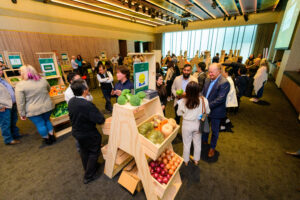 The final day of the program concluded with the AUSVEG Fresh Produce Showcase, a highlight event for international businesses who participated in the week-long program. Grower-exporters from the Australian horticultural industries, including vegetable, onion, potato, melon, citrus, berries, stone fruits, apple, and banana industries showcased their products to international buyers and significant business interest was generated as a result of the event.
The final day of the program concluded with the AUSVEG Fresh Produce Showcase, a highlight event for international businesses who participated in the week-long program. Grower-exporters from the Australian horticultural industries, including vegetable, onion, potato, melon, citrus, berries, stone fruits, apple, and banana industries showcased their products to international buyers and significant business interest was generated as a result of the event.
Delivered by AUSVEG and supported by Hort Innovation, Global Victoria, and the Tasmanian Department of State Growth, this year’s AUSVEG Fresh Produce Showcase has expanded its footprint. The event now features a broader range of citrus varieties and highlights diverse regions across Australia renowned for producing the highest quality fresh produce.
Key Takeaways and Future Prospects
The 2024 AUSVEG Reverse Trade Mission underscores Australia’s commitment to being a global leader in horticulture. By fostering international relationships and showcasing the industry’s excellence, the program paves the way for a sustainable and prosperous future for Australian vegetable growers.
As the world continues to seek high-quality, clean, and sustainable food sources, Australia’s horticulture industry is well-positioned to meet this demand. The connections and partnerships formed during the Mission will undoubtedly contribute to the growth and success of the industry, ensuring that Australian vegetables remain a staple in markets around the globe.
The inbound trade mission received positive feedback from delegates, who appreciated the opportunity to meet growers and visit farms in key horticulture production areas of Victoria and Tasmania. Some immediate trades have commenced after the Mission with most of the delegates indicating they expect significant trade to happen as a result of their participation. The majority of the delegates would welcome the opportunity to attend similar trade development initiatives in the future.
It is crucial for Australian vegetable, onion, and melon grower-exports to continue to amplify their presence in these export markets. By expanding their reach, they not only open new avenues for trade but also contribute significantly to the prosperity of the industry as a whole. For example, increased visibility in international markets can lead to higher demand and better pricing, benefiting growers and strengthening the sector. Just as a well-nurtured plant yields a bountiful harvest, a robust export presence fosters growth and resilience in the agricultural industry. This strategic focus helps ensure the continued success and sustainability of Australian produce on the global stage.
The Reverse Trade Mission 2024 was a testament to the strength and potential of Australian agriculture, and its success will inspire future endeavours aimed at fostering international trade and cooperation in the sector.
The 2024 Reverse Trade Mission is funded through the Hort Innovation Vegetable, Onion and Melon Funds and was supported by Global Victoria and Tasmanian Department of State Growth. The Australian Trade and Investment Commission (Austrade) has also provided substantial assistance to the program.
The Multi-industry Export Program is a strategic levy investment under the Hort Innovation Vegetable, Onion and Melon funds.
Project MT21009
Images: Courtesy of Brisbane Event Photography

